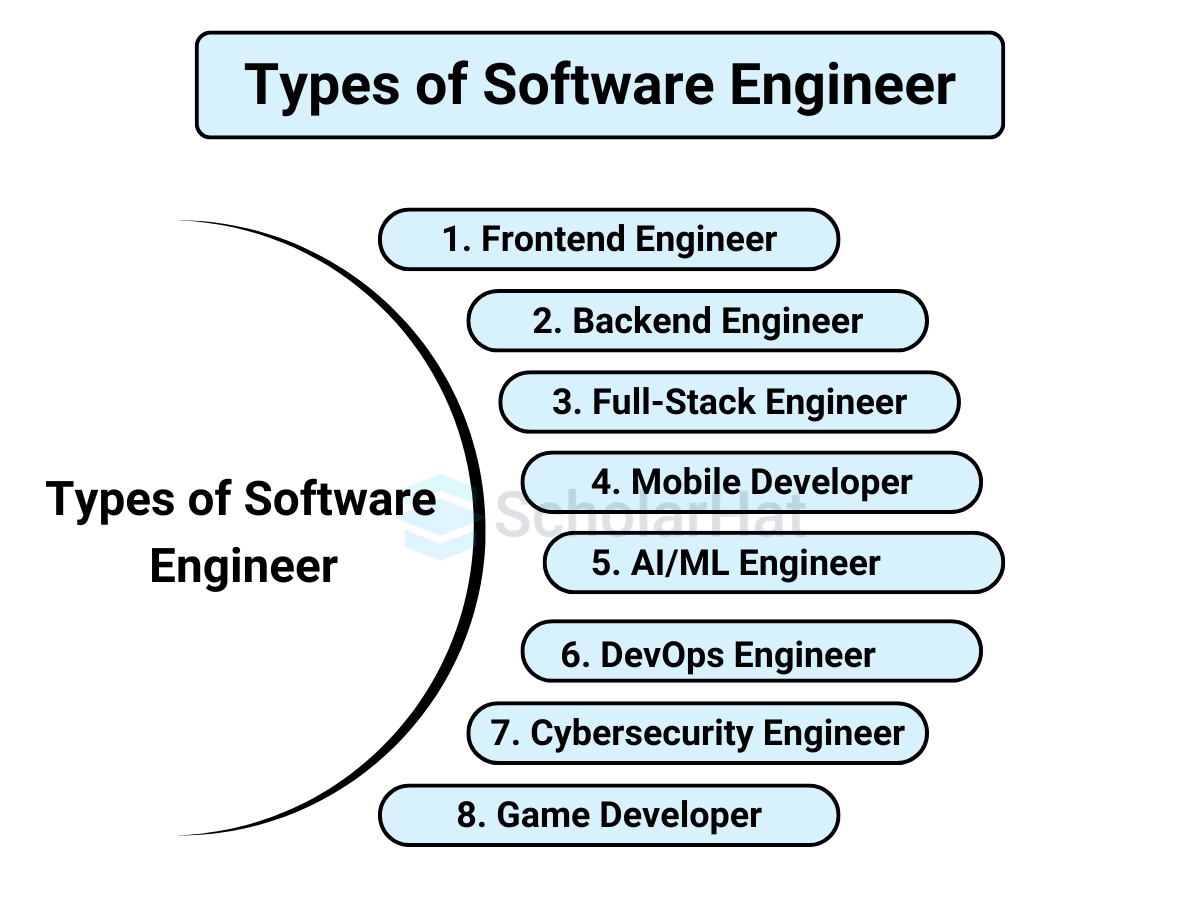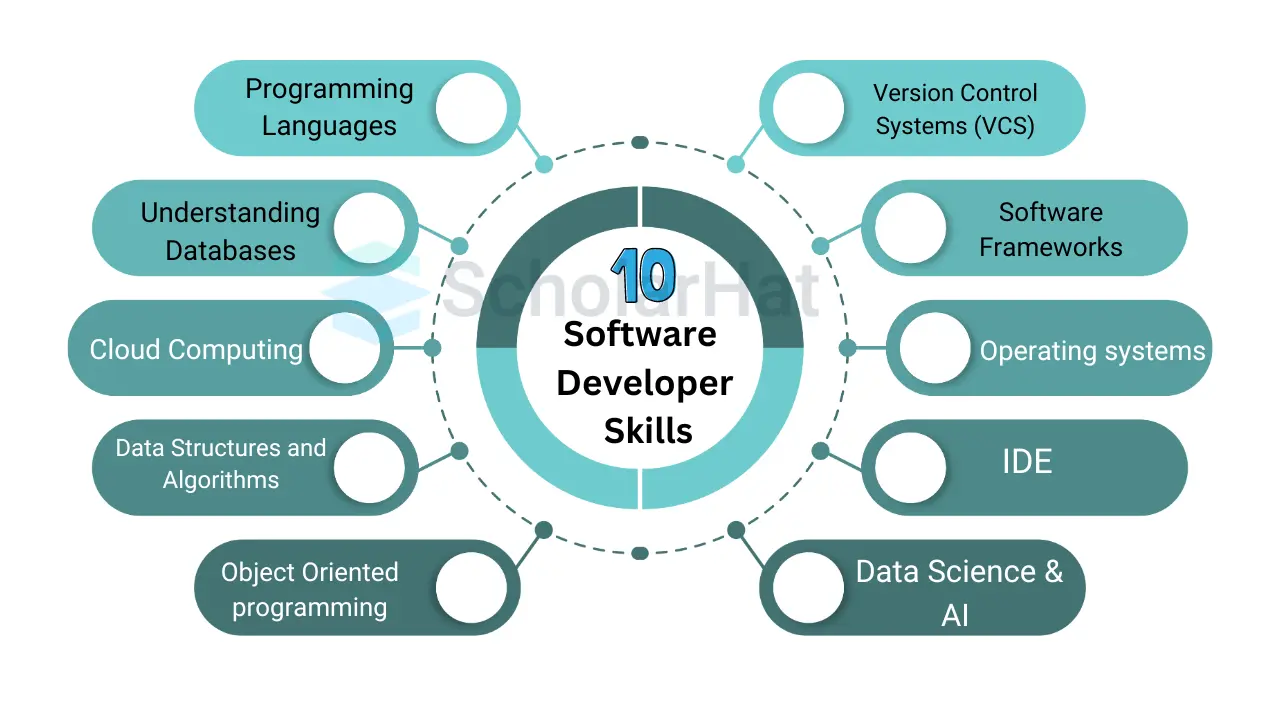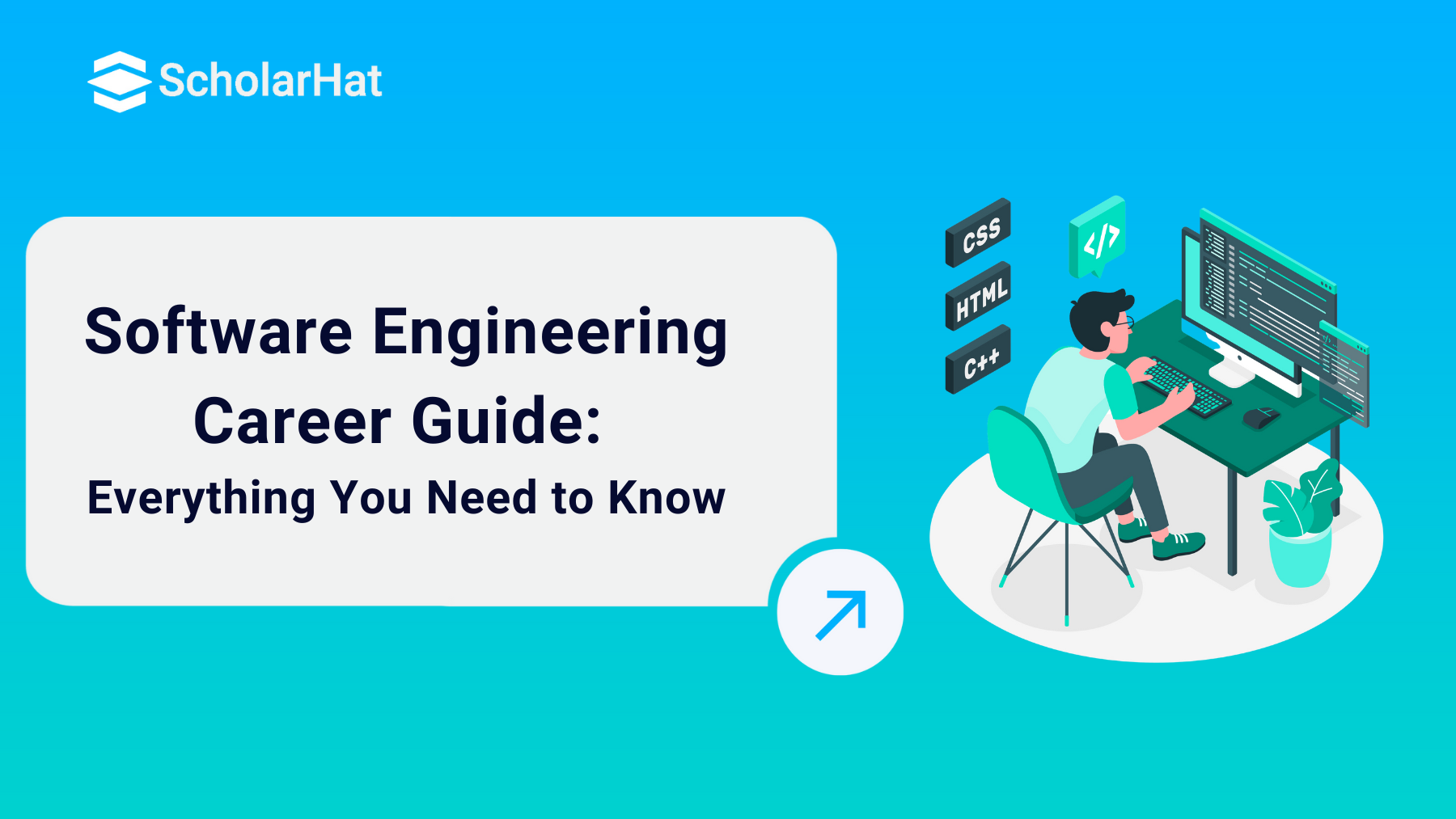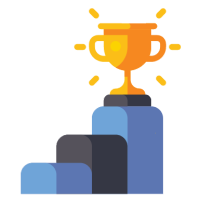26
AprHow to Become a Software Engineer: No Experience to Pro
Ever wondered how apps, games, and AI tools are made? Software engineering powers everything around us, and the best part—it’s not magic! Anyone with curiosity and the right guidance can learn to code. Whether you want to work at a top tech company, build AI, or create your own projects, this guide will show you how to get started.
In this Career tutorial, you’ll learn how to become a software engineer from scratch. We’ll break it down step by step—what to know, where to practice, and how to get hired. If you’re ready to turn your tech dreams into reality, let’s get started!
What does a Software Developer do?
A Software Developer is the person who creates the apps, games, and websites you use every day. They write the code that makes these things work, turning ideas into real, working programs. Without software developers, there would be no social media, online shopping, or even smart AI tools.
Here’s what a Software Developer does for you:
- Builds apps and websites – They create the tools you use daily, like Instagram, YouTube, or shopping apps.
- Solves problems – They fix bugs and improve software to make things run faster and better.
- Works with AI and smart tech – They help create intelligent software, like chatbots and voice assistants.
- Keeps technology growing – They constantly learn new things to build better and more advanced software.
In simple words, software developers bring technology to life and make your digital world work smoothly!
Types of Software Engineers
Software engineers have different roles depending on what they build and how they improve technology. Each type focuses on a specific part of making apps, websites, and software work smoothly.

Here are the main types of software engineers:
1. Frontend Engineer
Frontend Engineers design and build the part of a website or app that people see and use. This includes buttons, colors, menus, and animations. Your job is to make sure everything looks good and works smoothly on different devices.
2. Backend Engineer
Backend Engineers take care of the behind-the-scenes part of an app or website. This means handling data, servers, and logic to make sure everything runs properly. If you’ve ever logged into an account or made an online payment, a backend engineer made it possible.
3. Full-Stack Engineer
Full-Stack Engineers do both frontend and backend work, building complete applications. This means you can create the design users see and also manage how data is processed in the background. Full-stack engineers are like all-rounders in software development.
4. Mobile Developer
You create apps for smartphones and tablets, like Android and iPhone apps. Whether it’s a social media app or a banking app, mobile developers make sure it works smoothly on different devices.
5. AI/ML Engineer
You work with artificial intelligence and machine learning to build smart software. This includes things like chatbots, voice assistants (like Siri), and recommendation systems (like Netflix suggesting movies for you). AI engineers make computers smarter and more helpful.
6. DevOps Engineer
You focus on keeping the software running smoothly after it is built. This means managing servers, fixing issues, and making sure updates are delivered without breaking anything. DevOps engineers help companies launch apps faster and keep them working.
7. Cybersecurity Engineer
You protect websites, apps, and systems from hackers. Your job is to keep user data safe by finding security problems and fixing them before they can be exploited. Cybersecurity engineers help prevent cyber-attacks and data breaches.
8. Game Developer
You design and build video games for computers, consoles, and mobile devices. This includes creating characters, animations, and gameplay features to make the game fun and engaging.
Every type of software engineer plays an important role in making technology better, faster, and more useful in everyday life!
Software Engineering Career Path – Where to Start?
Starting a career in software engineering might feel overwhelming, but don’t worry—you don’t need to be a genius to begin. All you need is curiosity, patience, and a step-by-step plan. Whether you’re a complete beginner or switching careers, you can start learning today and grow into a skilled software engineer.
Here’s where you should begin:
1. Learn the Basics of Coding
Start with beginner-friendly programming languages like Python, JavaScript, or Java. These languages are widely used and easier to understand.
Typical backend and frontend coding languages to learn include:
- C
- C#
- ASP.Net
- C++
- Java
- Cascading Style Sheets (CSS)
- Python
- JavaScript
- Hypertext Markup Language (HTML)
- Angular
- React
- Typescript
- Bootstrap
- JQuery
- Full Stack
If you want to learn any of the above languages We have some Certifications for you that will give you in-depth knowledge plus a Certified tag.
2. Choose Your Path
Decide what kind of software engineer you want to be. Do you enjoy designing websites? Go for front-end development. Want to work with data and servers? Try backend development. If mobile apps excite you, learn Android or iOS development. If you’re not sure, start with full-stack development to explore both frontend and backend.
3. Practice by Building Projects
The best way to learn is by doing. Create small projects like a personal website, a to-do list app, or a simple game. This will help you understand how real-world software works and improve your coding skills.
4. Learn Data Structures and Algorithms
Data Structures and Algorithms are the problem-solving techniques used in coding. Many tech companies test these skills in job interviews.
Master the below fundamentals of data structure:
You need to have a clear-cut understanding of the building blocks of a programming language. They remain the same for all the languages.
The following are the topics:
- Variables: Variables in C, Variables in C++, Variables in Java, Variables in Python
- Data Types: Data Types in C, Data Types in C++, Data Types in Java, Data Types in Python
- Operators: Operators in C, Operators in C++, Operators in Java, Operators in Python
- Basic Input/Output
- Functions: Functions in C, Functions in C++, Functions in Python,
- Conditional Statements: Conditional Statements in C, Conditional Statements in C++, Conditional Statements in Java, Decision-Making Statements in Python
- Loop Control: Loops in C, Loops in C++, Looping Statements in Java, Loops in Python
- Arrays: Arrays in C, Arrays in C++, Java Arrays
| DSA Certifications |
| Data Structures and Algorithms Training |
| Data Structures and Algorithms Training with C# |
5. Get Hands-On Experience
Work on open-source projects, contribute to GitHub or do internships. These experiences will help you learn teamwork, debugging, and real-world coding practices.
6. Build a Portfolio and Resume
Create a GitHub profile to showcase your projects and a LinkedIn profile to connect with professionals. A strong portfolio makes it easier to get noticed by recruiters.
7. Apply for Jobs and Keep Learning
Once you have skills and projects, start applying for junior developer roles. Keep learning new technologies, take part in coding challenges, and stay updated with the latest trends in software development.
Software engineering is a journey, and every expert was once a beginner. Stay curious, keep practicing, and you’ll find your place in the tech world!
Essential Software Development Skills in the AI Era
Software development is changing fast, and AI is becoming a big part of it. If you want to succeed as a developer in this new era, you need to go beyond basic Software Development Skills. Learning AI-related skills along with traditional development skills will help you stay ahead and create smarter software.

1. Strong Programming Skills
You still need solid coding knowledge. Focus on Python (great for AI and automation), JavaScript (for web and AI-powered apps), and C++ or Java (for performance-heavy applications).
2. AI & Machine Learning Basics
AI is becoming a part of everyday software. Learn machine learning concepts and tools like TensorFlow, PyTorch, and OpenAI APIs to integrate AI into your projects.
3. Cloud Computing & DevOps
Modern apps run on the cloud. Get familiar with AWS, Google Cloud, or Azure, and learn Docker and Kubernetes to manage software efficiently.
4. API Development & AI Integration
AI-powered services rely on APIs. Learn how to build and connect APIs using REST, GraphQL, and AI-based APIs like OpenAI’s GPT.
5. Cybersecurity Awareness
With AI-powered threats increasing, security is more important than ever. Understand secure coding, data protection, and cybersecurity best practices to build safe and reliable software.
Software Engineer Roles and Responsibilities
A software engineer’s job is to build and improve software that people use every day. You don’t just write code—you solve problems and make sure everything runs smoothly. Here are five simple and important responsibilities you’ll have:
1. Writing and Testing Code
Your main job is to write clean code that makes websites, apps, and software work. You also need to test your code and fix any errors to make sure it runs properly.
2. Planning and Designing Software
Before coding, you need to plan how the software will work. This includes choosing the right tools, designing the features, and making sure it is user-friendly.
3. Working with a Team
You won’t work alone! Software engineers work with designers, testers, and other developers to create the best software possible. Good teamwork is important.
4. Fixing and Updating Software
Once the software is built, it needs regular updates and bug fixes to keep it working well. You will improve features, add new ones, and make sure everything runs smoothly.
5. Keeping Software Safe and Fast
Security is important! You need to protect software from hackers and make sure it runs fast without slowing down or crashing.
Salary Expectations and Job Opportunities in 2025
As a software engineer salary in 2025, you can expect competitive salaries and numerous job opportunities, especially with the rapid growth of technology and AI in India.
Salary Expectations
- Entry-Level Positions: Fresh graduates starting as software engineers can anticipate an average annual salary of around ₹10,00,000.
- Mid-Level Positions: With 3 to 5 years of experience, salaries typically range between ₹8,00,000 to ₹15,00,000 per annum.
- Senior Positions: Experienced professionals in leadership roles or specialized fields can earn between ₹15,00,000 to ₹30,00,000 annually. Source: GlassDoor
Job Opportunities
- Growing Demand: India's job market is projected to grow by 9% in 2025, with the IT sector leading this expansion.
- Emerging Technologies: There's a high demand for skills in AI, cloud computing, and cybersecurity.
- Global Companies Investing in India: Firms like Broadridge Financial plan to increase their tech workforce in India by 26% over the next three years, highlighting the country's importance in the global tech landscape. Source: GlassDoor
In summary, 2025 offers promising prospects for software engineers in India, with attractive salaries and a variety of opportunities, especially for those skilled in emerging technologies.
Future Trends in Software Engineering
Software engineering is evolving fast, and new trends are shaping how you build and work with technology. Here are the top trends you should know:
1. AI-Assisted Coding
AI tools now help you write code faster and fix errors quickly. They suggest solutions, reduce mistakes, and make coding easier for everyone.
2. Low-Code & No-Code Development
You don’t always need to write long code! Platforms with drag-and-drop tools let you build apps faster, even with little coding knowledge.
3. Cloud & Edge Computing
Software is moving to the cloud, making it easier to access and scale. Edge computing helps process data closer to users, making apps faster.
4. Stronger Cybersecurity
As technology grows, so do security risks. You must learn how to build safe software that protects data from hackers and cyber threats.
5. Lifelong Learning
Tech keeps changing! To stay ahead, you need to keep learning new tools, languages, and trends to stay relevant in the field.
These trends will shape the future of software engineering, so be ready to adapt and grow!
Choose the Right Software Development Program
Picking the right software development program is important for your learning and career. Here’s how you can make the best choice:
1. Know Your Goals
Do you want to build websites and apps or work with AI? Choose a program that focuses on the skills you need for your dream job.
2. Check the Curriculum
A good program should teach coding, problem-solving, and real-world projects. Look for courses that cover Python, JavaScript, databases, and cloud computing.
3. Consider Online vs. Offline Learning
Online programs offer flexibility, while in-person classes provide hands-on guidance. Pick the one that fits your schedule and learning style.
4. Look for Hands-On Practice
Learning by doing is the best way to improve. Choose a program with projects, coding challenges, and internships to gain real experience.
5. Read Reviews and Success Stories
Check if past students got good jobs after completing the program. Their experiences can help you decide if it’s worth it.
The right program will set you up for success, so take your time and choose wisely!
How to Become a Software Engineer After 12th
If you’ve just finished 12th grade and want to become a software engineer, here’s a simple step-by-step guide to help you start your journey:
1. Choose the Right Course
- Degree Path: You can pursue a B.Tech/B.E. BCA in Computer Science, IT, or Software Engineering.
- Alternative Path: If you don’t want a degree, you can take diploma courses or join coding boot camps.
2. Learn Programming Languages
- Start with Python, Java, C++, or JavaScript—these are commonly used in software development.
- Practice coding daily on platforms like LeetCode, CodeChef, or HackerRank.
3. Work on Real Projects
- Build small projects like websites, apps, or games to improve your skills.
- Contribute to open-source projects and showcase your work on GitHub.
4. Get Certifications and Internships
- Online certifications in AI, cloud computing, or cybersecurity can boost your resume.
- Internships help you gain real-world experience and improve job prospects.
5. Apply for Jobs or Freelance
- Start with entry-level jobs, internships, or freelancing to gain experience.
- Prepare for interviews by practicing coding problems and system design questions.
With dedication and continuous learning, you can become a successful software engineer!
Conclusion
If you’ve ever wanted to build apps, create AI tools, or work on exciting tech projects, software engineering is the way to go. You can start from anywhere with just curiosity and practice!Learning to code not only gives you excellent career opportunities but also the power to bring your ideas to life. So why wait? Start today and take the first step toward an exciting future in tech!
| Further Read Articles: |
| Software Engineer Salary in India: Average Salary |
| Top 10 Software Developer Skills |
| 7 Phases of the Software Development Life Cycle |





